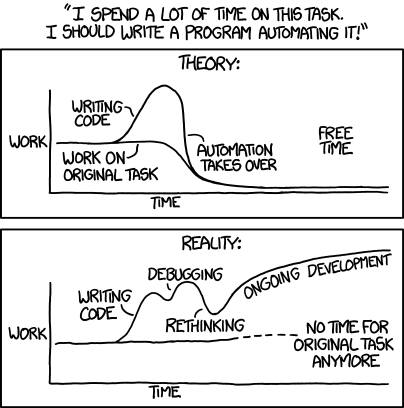DevTools > Leverage
There are only so many hours to work, and you want to use them in a way that gets you the most value for your time and energy. One way to achieve that is become a force-multiplier and make everyone around you more effective by working on Developer Tools. Of course, the math only works out if anyone uses your tools in the first place.
A toolmaker succeeds as, and only as, the users of his tool succeed with his aid. – Fred Brooks, The Computer Scientist as Toolsmith
A model you shouldn't take too seriously
Being a toolsmith is only valuable if the incremental gain from working as a toolsmith is higher than directly working on the problem.
Paraphrasing Randall's model, automation can, occasionally, be helpful. I'm still trying to decide if I should be impressed or terrified that there's always an appropriate XKCD comic for everything I write. With significantly more clarity, fewer words, and better humor.

As heretical as it may sound, I tried to improve on this model. Varying both the size and value of the toolsmiths' work defines an envelope where toolsmiths can be very effective – or completely useless.
The complete underlying model is on DeepNote (a fairly promising new notebook platform). A summary:
Consider a team with a hundred engineers; think about
- the total impact you think toolsmiths can have
- how much work do toolsmiths need to do to achieve it (compared to the actual result)
Choosing to maximize the work done or minimize the time taken results in an optimum number of toolsmiths: ranging from 0 (if they're unlikely to have any meaningful effect) to 70 (if they could potentially 10x all the other engineers). Under ideal circumstances, you can get an order of magnitude more work done – or halve the time to complete your initial project.

Choosing appropriate points along the axis is hard, of course: particularly if you decide you want to consider the company's lifetime as the actual project. You can choose an appropriate "productivity multiplier" based on how much opportunity exists.
It wouldn't be engineering if there weren't any trade-offs. In this case: a team including toolsmiths will initially be slower than one without, but it will catch up and leapfrog the other team as the toolsmiths continuously improve and refine the processes.
If you believe that your company has too few toolsmiths: you should have an excellent opportunity to have an outsized impact quickly.
As a career
I would generally recommend working on Developer tools if you enjoy understanding the nitty-gritty of systems programming, programming languages and still enjoy owning a product. I've often had a chance to understand systems and write complex tree traversals for visualizations. You also have the delightful opportunity to be your own customer, which means your intuition often guides you in the right direction. Yes, sometimes you do get a chance to use those interview question solutions.
It's also highly satisfying to see people move faster and solve previously impossible problems because of your tools. Given the sheer amount of improvement possible, working on useful tools tends to work out career-wise as well.
There are downsides, of course. Toolsmiths are at least one step removed from the actual work that's going on – it can be hard to explain what we built to anyone without context (or violating NDAs). Depending on how enlightened your management is, your team might also be severely underfunded for what it needs to accomplish, mainly because the effect of good tools isn't generally easy to measure.
Over the larger arc of your career, I'd recommend switching between roles every so often: build a product, build tools to make that experience better; go back and continue building the product; and repeat. You'll become a more rounded and effective engineer once you have experience across both sides. It's not a completely binary decision either; you could always split your time and play toolsmith for a part of the week.
Finally, if you have senior anywhere in your title or job description: an implicit part of your job is to make the people around you more effective. Diving into – and fixing – tools should be a meaningful use of your time.
Comments
Add your comments on Hacker News, to this Twitter thread, or drop me an email.
2/ https://t.co/JqylNrdti8
— Kunal Bhalla (@kunalbhalla) June 24, 2021
Why I consider it valuable to work on developer tools, with some absurdly simple models. pic.twitter.com/LJGCAphoV5